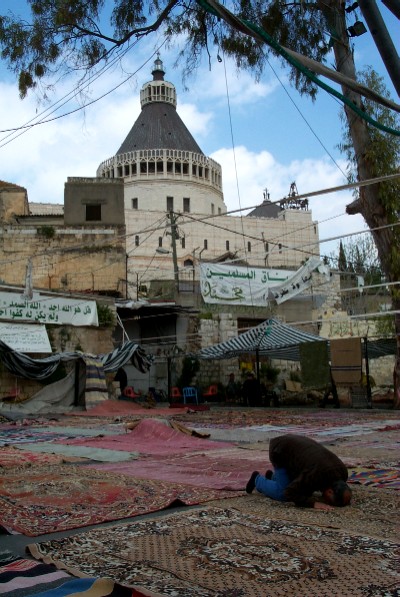
|
DAILY UPDATES THURSDAY, MARCH 15
|
 |
|
The Muslim call to prayer echoes from a makeshift minaret in the central square of Nazareth. Two small speakers sit on the highest branches of a tall tree in the middle of a parking lot which a part of the city's Muslim community has taken possession of. Muslims pray on prayer rugs laid in the middle of lot or under a haphazardly erected tent made from plastic tarps, in the shadow of the massive Basilica of the Annunciation, a direct challenge to the city's large Christian population. Two years ago, the parking lot was paved on the site of a school that was demolished to accommodate Pope John Paul II's Jubilee visit to the Holy Land last year. Muslims claimed the land, which is municipal property, for a mosque that they want to build in honor of a Muslim sage, buried there in the 12th century. Christians wanted to use the site to create a public park. But since the latest Intifada, whatever tension existed between Nazareth's Christians and Muslims has dissolved in the face of a new found solidarity. The Arab identity of both communities has taken precedence over their religious differences. Members of both communities insist that the rift between the groups was not based on religion. Some go as far as to say that it was created by the Israeli government to divide the Arabs. "The government needs this tension," says Waleed Jarjoura, an occupational therapist and Christian resident of Nazareth. "Because of the Intifada we are more united than before," he says. The Intifada caused the Arab residents of Nazareth to close their ranks in the face of what they saw as Israeli police brutality towards all Arabs. When riots broke out last October between the Jewish residents of the neighboring town of Nazareth-Illit and the Arab residents of Nazareth, Israeli police fired on the Arab protesters, killing three of them. "The police treat us like they used to treat the blacks in South Africa. They don't treat us like human beings. They treat us like fourth class people," says Issam Zuabi, a Muslim, sitting in his coffee shop opposite the disputed site, with his Christian boyhood friend, Wael Nusair, an optometrist. "We live together as brothers, we work together and play football (soccer) together, says Nusair. "There's no tension," adds Zuabi. In the Mayor's office, adorned by framed photographs of the three dead Arabs, Ali Salam, and Ahmed Zoubi, two of Nazareth's three deputy mayors explained how the city's Arab residents and political parties had come together. They keep the bullets fired on the Arabs during the riots, with postcards of Omar Aksyi, Misam Yesbek and Iyad Lubni, the three Arabs killed, as tangible symbols of the enemy that unites them. "The Jews, they are the problem," says Zoubi. "No, it is Zionism that's the problem," says Salam, as Zoubi nods his head in agreement. Fueling this anger is the economic hardship apparent in this city which depends on tourism. The shops, which advertise their wares in Arabic, English and Hebrew, are empty. Inevitably, the Jews of Nazareth-Illit, who used to shop in Nazareth, have become the focus of bitter resentment. Nazareth-Illit, which has a population of 40,000 Jews, is situated on a ridge right above Nazareth. The road that used to connect it with Nazareth now acts like a physical border. The Arabs of Nazareth point to the suburban environment of Nazareth-Illit as evidence of the Jews' prosperity compared to their own hardship. A large shopping mall, new government buildings and villas tower over their city, which has 70,000 residents and a lack of services. "Since 1975 we have been asking for a new municipal center," says Ihab Sabbah, Nazareth's municipal planning director. "Nazareth-Illit got a new one last year." For their part, the Jews are mistrustful and afraid of going near their neighbors in Nazareth. "I will always be afraid of them," says Lital Golani, a 20-year-old soldier, who said she used to have Arab friends but not anymore, as her parents do not want her to maintain friendly relations with Arabs. "I'm more scared for my children than I am for myself," says Riki Hanan, a Nazareth-Illit resident who works in the shopping mall. "I don't go to the Arab village to shop, I go to Haifa," she says. The aftermath of the riots and the sharp decline in tourism of the area has left Nazareth's economy reeling. Three of the largest hotels, the Renaissance, the Howard Johnson and the Marriott have all closed since the Intifada began. Unemployment in Nazareth has risen from three percent in 1998, well below the national average of eight percent, to 13 percent today, according to Sabbah. In times of economic prosperity, a dispute between the two Arab communities was allowed to bubble over into open conflict. In current atmosphere this conflict over a religious site is easily overlooked in favor of solidarity. In an alleyway deep inside the old city, Nazareth's old men, Christian and Muslim, gather together in a simple room with a wooden cross hanging on the wall. "The same men come here for 50 years," says Samih Abu Salem, the owner of the club. "We are 50-50 Christians and Muslims," he says of the 10 men playing hand rummy around three tables. One man fingers a sting of Muslim prayer beads as another plays with his blue rosary. Another stands up, spreads his arms wide and announces, "We are all brothers!" to laughter in the room.
(From Left to Right: Ahmed Zoubi, Deputy Mayor of Nazareth; Issam Zuabi, Mayor of Nazareth).
CLICK HERE TO RETURN TO DAILY ARTICLES
|